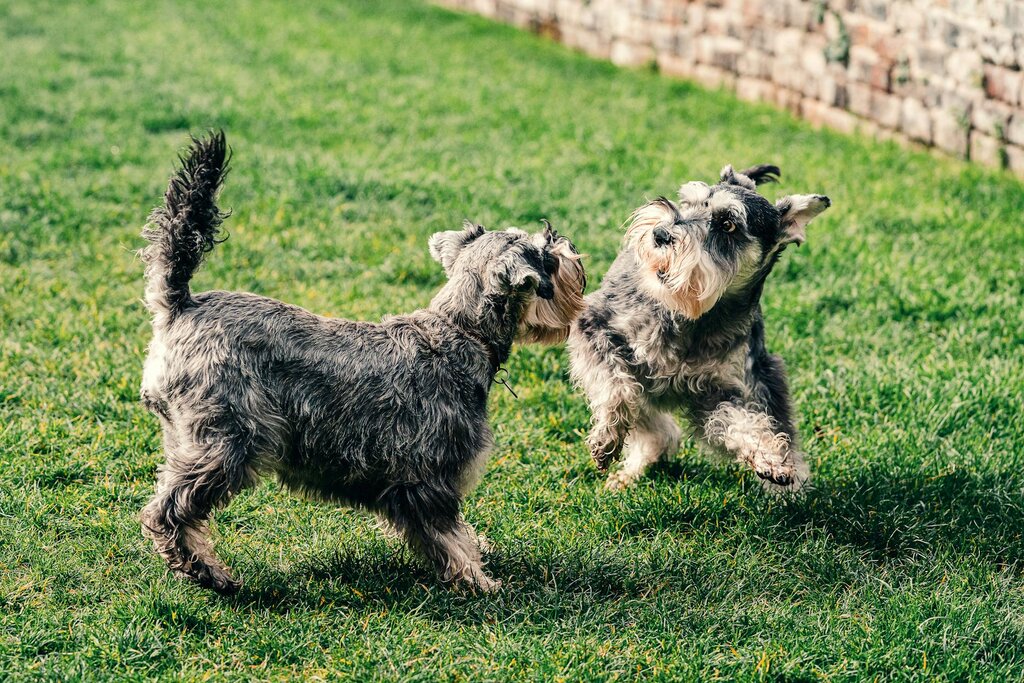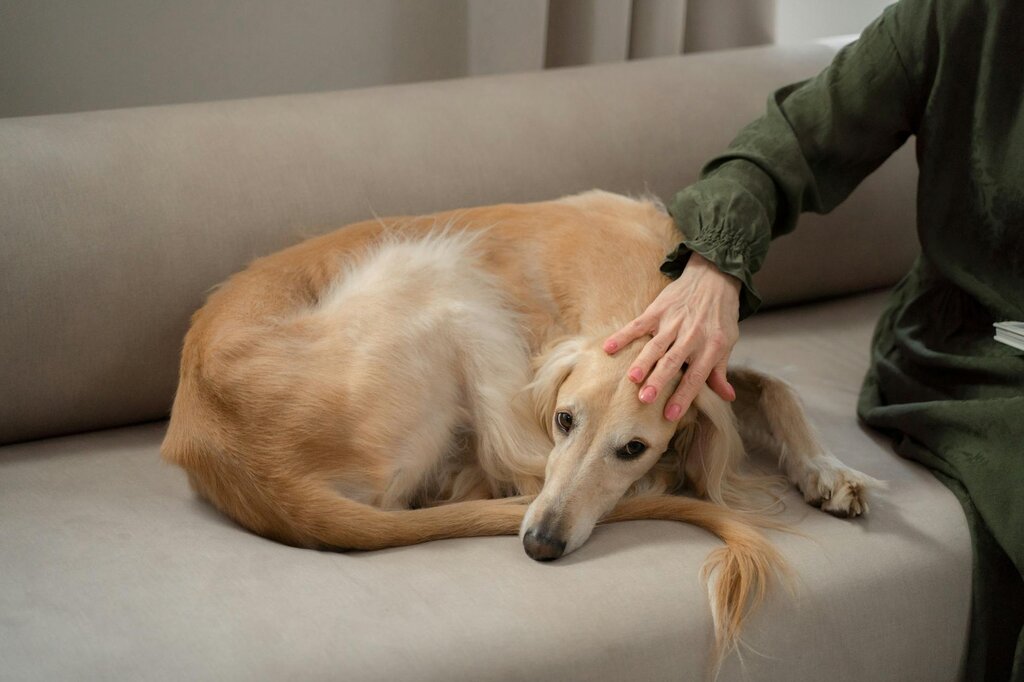Last Updated: 28/05/2025
Kennel Cough In Dogs
Kennel Cough is a common infectious disease in dogs. Find out more about the causes and treatment.
Author: Dr Carla Paszkowski BVSc (Hons)
Reading Time: 23 minutes - medium read
Kennel cough is a common respiratory illness in dogs, often characterized by a distinctive coughing sound. Contrary to its name, it can be transmitted anywhere dogs interact, not just kennels. While treatable, the best prevention is to ensure your dog is up-to-date on vaccinations.
What is kennel cough?

Kennel Cough, or Canine Infectious Respiratory Disease Complex (CIRDC), is an umbrella term that includes several highly infectious diseases which can cause inflammation and irritation in a dog's respiratory system. This includes the windpipe (trachea) and voice box (larynx). The term 'kennel cough' has been popularized because the disease spreads rapidly in environments where dogs are kept in close proximity, such as kennels, animal shelters, and pet stores.
Unlike other diseases (such as Coronavirus) which are caused by one pathogen, 'Kennel Cough' or 'CIRDC' refers to a syndrome of diseases that can be caused by several different species of bacteria and viruses.1 The germs responsible for Kennel Cough are often highly contagious, and many cases involve more than one causal pathogen.
What causes kennel cough?
Kennel Cough is caused by multiple viruses and bacteria, often in combination. Some of the most common pathogens include Bordetella bronchiseptica (a bacterium), Canine parainfluenza virus, and Canine adenovirus type 2. These pathogens are airborne and can be spread through direct contact, contaminated surfaces, or even through the air, especially in enclosed spaces.
Kennel cough may be caused by any singular or combination of the following pathogens:
- Bordetella bronchiseptica bacteria
- Parainfluenza Virus
- Canine Adenovirus
- Canine Distemper virus
- Canine Herpes virus
- Canine Reovirus
Usually, Bordatella bacteria is the main culprit, and a co-infection with a secondary virus is present. This is why the vaccine for Kennel Cough is based around the Bordatella bacteria and why it is sometimes called the Bordatella vaccine.
Different pathogens can help each other to infect the host. For example, canine distemper virus causes profound immunosuppression, which predisposes dogs to infection with other respiratory viruses and bacteria. 3
How do dogs catch kennel cough?
Kennel cough is very contagious and usually caught from contact with other infected dogs. It is spread via airborne/droplets anywhere that dogs are in close proximity to each other. It is also transmitted via contaminated toys, food bowls or other shared objects.
Despite the name, dogs can catch Kennel Cough from any contact with dogs - not just in a Kennel! The incubation period of Kennel Cough (the time it takes for signs to show after catching it) is between 2-14 days. This means that dog can be infectious without showing outward signs.
Kennel cough symptoms

Dogs with kennel cough may show any or all of the symptoms below:
- A pronounced cough, often with a "goose honking" sound
- Coughing bouts often ends with a marked retch or gag
- Lethargy
- Runny nose or eyes (occasionally)
- Loss of appetite
- Fever
Clinical signs are often mild and self-limiting; however, some cases progress to severe disease. The severity does depend on which pathogens they are infected with, their age, general health, and vaccination status. 2
If your dog is coughing, it's important to get a proper diagnosis at your vet, to ensure they receive the appropriate treatment. Coughing may also be caused by conditions such as a collapsing trachea, bronchitis, asthma, heartworm, and even heart failure.
Kennel cough treatment
In many cases, dogs can recover from kennel cough without treatment within three weeks, but symptoms can sometimes linger for up to six weeks. It is similar to the human flu - with good immunity, a healthy body will eventually fight it off. However, medication is usually required if the symptoms are severe or worsening, or if your dog is not eating or drinking.
Medication
Your vet may prescribe medication depending on your dog's individual case. Medications used to treat Kennel Cough are usually aimed at killing the Bordatella bacteria (ie, antibiotics) as well as treating the symptoms (ie, IV fluids to combat dehydration and anti-inflammatories to reduce a fever). Cough suppressant medication may also be useful.
Home tips
To aid in your dog's recovery, keep your home well ventilated and avoid using a collar and lead, as pulling can aggravate the trachea (a dog harness is a better option). It can also help to keep them well-rested and encourage water intake. Most importantly, be a reponsible pet owner and keep them away from other dogs while they are contagious to minimise the spread. This means delaying any playdates or trips to the dog park for a couple of weeks until they are all better.
Kennel cough vaccination

By far the easiest and most effective way to protect your dog from Kennel Cough is to maintain their vaccinations. Simple respiratory infections can easily evolve into dangerous and life-threatening pneumonia, so it's best practice to keep the Bordetella vaccine into your dog's preventative care plan.
The vaccine has life-saving benefits. While it's still possible for vaccinated dogs to develop Kennel Cough, they are far less likely to contract Kennel Cough after exposure, and are significantly less likely to develop serious symptoms or life-threatening complications once infected.
In Australia, dogs are routinely vaccinated against Canine Parvovirus, Canine Adenovirus (Infectious Hepatitis), Distemper and Kennel Cough (Canine Parainfluenza II + Bordatella bronchiseptica). The Kennel Cough portion is generally delivered yearly as an injection, intra-nasal or oral vaccine, as outlined below:
Dog vaccinations in Australia
Different vaccine manufactureres offer different regimes for dogs. Your vet may offer one or either regime, depending on the clinic. Different types of vaccines include:
- A yearly C5 which includes Canine Parvovirus, Canine Adenovirus (Infectious Hepatitis), Distemper and Kennel Cough (Canine Parainfluenza II + Bordatella bronchiseptica) given every year
- A C3 (Canine Parvovirus + Adenovirus + Distemper) given every 3 years combined with a Kennel Cough booster (Canine Parainfluenza II + Bordatella bronchiseptica) given every year.
- In both cases, the Kennel Cough portion may be delivered in oral, intranasal, or injectable forms.
Side effects of kennel cough vaccination
As with humans, mild adverse reactions to vaccines occur occasionally. Reactions to the vaccine are generally mild and short-lived, and are almost always milder than the disease itself. Below is a list of the most common side effects dogs experience from the Kennel Cough vaccine. The most common side effects include:
- Lethargy. The most common reaction a dog will have to receive the Bordatella vaccine is a feeling of tiredness often accompanied by a very mild fever. These symptoms are normal and should only last a day or two.
- Injection site swelling. If your dog receives the injectable form of the vaccine, a lump can develop around the injection site as well as some tenderness or stiffness in the area.
- Sneezing or runny eyes. If your dog received the intranasal form of the vaccine, it is normal for cold symptoms to occur including coughing, sneezing, and a runny nose. Most dogs recover from these symptoms within a day or two.
While vaccination against kennel cough may not completely prevent infection, it is likely to reduce the severity of symptoms and result in a quicker recovery. Kennel cough is highly contagious and most dogs are likely to be exposed to it multiple times in their life, so it is highly recommended that kennel cough vaccinations are kept up to date for all dogs in Australia.
References
Buonavoglia C, Martella V. Canine respiratory viruses. Vet Res . Mar-Apr 2007;38(2):355-73. doi: 10.1051/vetres:2006058. Epub 2007 Feb 13
Reagan KL, Sykes JE. Canine Infectious Respiratory Disease. Vet Clin North Am Small Anim Pract. 2020 Mar;50(2):405-418. doi: 10.1016/j.cvsm.2019.10.009. Epub 2019 Dec 5.
Sykes JE. 2020. Coughs & Colds: Update on Canine Infectious Upper Respiratory Tract Disease (SA221). Western Veterinary Conference 2020
Further Reading
History
Our experts continually monitor the health and wellness space and we update our articles when new information becomes available.
Thu Feb 27 2025
Edited by Dr Teagan Lever BVSc (Hons)Dr Carla Paszkowski BVSc (Hons)
Veterinarian
Dr. Carla graduated from the University of Queensland in 2013 with a Bachelor of Veterinary Science and worked for a number of years in small animal clinics across South East Queensland. While Carla enjoys most facets of clinical veterinary work, she holds a special passion for feline medicine, pocket pets, and nutrition.

